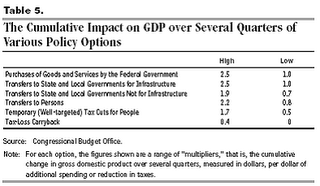Monday, August 03, 2009
Patience, it's just lagging

Ironman noted in comments a new tool he has to think about the impact of stimulus on the economy when you include a term for inefficiency of government spending, the amount of slack in the economy, and the cost of raising tax revenues. I have been playing with it for about the last thirty minutes, and the impression I get is that, while it's worthwhile to think about the other elements, the battle comes back to multipliers in the end. A reminder of the range of uncertainty about this, I think, is helpful; see above. This is an important reason why Menzie Chinn continues to pound away on the question.
What isn't as obvious from the table is how long it takes to get those multiplier effects. Arnold Kling notes yesterday that fiscal policy now appears to have long and variable lags, perhaps intentionally in the case of ARRA.
But unemployment would be falling then, just in time.I am willing to bet that the majority of the fiscal stimulus enacted earlier this year will actually hit the economy after positive economic growth has been restored. Furthermore, the multiplier effects of fiscal policy tend to hit with a lag, so we will be getting even more stimulus late in the game.
It is true that employment growth will be sluggish (if my guess is right), so it might not seem as though stimulus in 2011 is so bad, but the sluggish employment growth will reflect structural problems (mismatch between growing sectors and the employee skill base), not cyclical problems. The bottom line is that I think that in 2011 and 2012 we may be experiencing increased inflation while unemployment is high.









